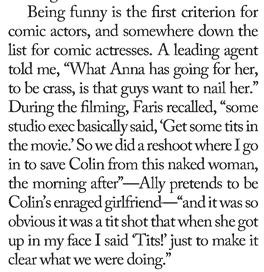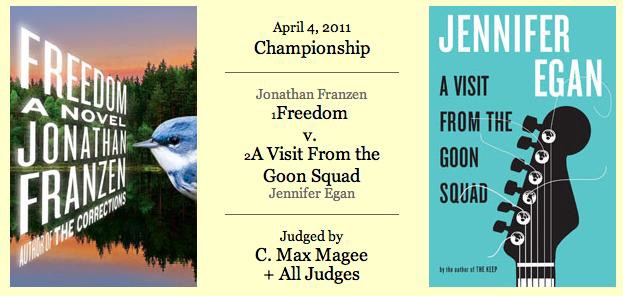Shocker: Losing Virginity Makes Guys Feel Better About Themselves
“Both male and female adolescents experience shifts in overall satisfaction with their appearances after having sex for the first time, according to a study published in the journal Adolescence. Researchers found that in the short-term, male subjects were more satisfied with their body image after having sex for the first time, while female subjects were less satisfied with their appearances in the same situation.” Researchers also found that having sex for the first time changed male subjects’ concept of time, causing them to perceive “one minute” as “hours.”
They Are Still Using Fax Machines In Spain
“Spanish police have arrested a man who twice escaped from custody by having his wife send fake faxes ordering his release.”
How To Tell A Playwright You Didn't Like His Play
by Christopher Shinn

I have a new play that starts in previews this week. That means I have a lot of friends, colleagues and acquaintances who are going to have to negotiate the tricky thing of what to say to me after my play if they happen not to like it.
Let me be clear: I’m totally fine with being lied to. I don’t long to be told what everyone I know truly thought of my play. But in my experience, many of them long to tell me. They may not be conscious of this, but that’s why God invented the unconscious. Deep down, most people really do want to tell me what they thought of my work, one way or another.
Over the years I’ve spoken to enough playwrights to gather that my experience is not unique. Therefore, I’ve prepared a little guide to help you navigate your way through the post-show interaction.
But first, there are people you don’t want to be after seeing your friend’s play.
The Projector
A good friend of mine was coming to see my play Dying City and we planned to see each other afterwards. I used the opportunity to check in on the show, which had been running a while.
I greeted my friend post-show with a big hug, and we expressed pleasure at seeing each other for the first time in ages. Then came the obvious next moment — the moment when someone says something nice about the play they just saw. Only he didn’t say anything — just smiled at me dumbly. Okay, a bit weird, I thought — but maybe he’s waiting to talk about it. So off we went to a nearby watering hole. And in a lull in the small talk my friend turned to me and said: “So what did you think of tonight?”
It takes great skill to use a question about what someone else thought to convey unmistakably what you yourself thought. Only the biggest assholes have this skill.
The Condenser
A colleague and someone I genuinely looked up to waited around the auditorium after one of my early plays, and when I saw him there I scurried over to say hello, eager to hear what he thought. He loved the play, it was remarkable, so moving, so interesting, I was such a wonderful writer… but there was a hesitation in his voice. What was it?
“One thing I didn’t like was the haircut,” he said cryptically.
“The haircut?”
“Of the main character. It should be spikier. It should look more like the hair that people his age have, when I walk around NYU and see these young people.”
“Ah.”
That wasn’t all. My colleague proceeded to talk about what was wrong with the lead character’s haircut for a solid three minutes — five times longer than he took when praising me. In fact, the actor’s haircut was entirely unremarkable. No one else who saw the play ever brought it up; no critic mentioned it. And so I as I sat there in the cold, empty theatre, listening to my colleague drone on and on about it, it became clear that the haircut was actually my play.
The Generalizer
A mentor gives me a big hug at the end of my first New York production.
“I’ve never seen anything like it!”
“Oh — thank you.”
“It’s so clearly your voice.”
“Thanks!”
“You really just wrote something that you wanted to write.”
“Yes…”
That is the generalizer. Ultimately you are left standing in an uncomfortable silence, when you can no longer deny that nothing that is being said to you can unequivocally be understood as praise.
The Magician
The magician disappears at the end of your play. You wait and look for him to no avail. Six months later, when he finally calls or emails to get together, no mention is made of the show. He’s made the play disappear!
The Globalizer
This is the worst of all because the most unexpected. The globalizer — a frequent theatergoer, perhaps a onetime practitioner — gives you a huge hug at the end of your play. He tells you how brilliant it was, how moving, how incredibly brave… you go out into the night feeling warm, protected — even loved.
Then around the second or third drink this happens:
“The problem with the theatre today is that these theatres refuse to take risks.”
Okay. Fair enough. Quite frequently true…
“When’s the last time a major theatre did a truly risky play?”
Yes. Well. You did just see mine…
“They’re terrified of anything authentic. As are critics. If critics like something universally, you know it’s not good.”
Right. Well. My play got pretty good reviews…
“At the end of the day, the theatre is dead.”
Note to fellow playwrights: Never give these people a second chance. They will just keep doing this. Trust me.
Now. If you truly, truly must convey to a playwright that you did not like their play, I have sketched out a few respectful ways to do so. Really — it can be done. And I’m sympathetic. People should not have to go through their entire lives lying about liking bad plays. There has to be a better way. Well, I don’t know if there has to be, but if you really can’t control yourself, be one of these people:
The Diplomat
At the moment of maximum vulnerability after the show, you are polite and kind. On the way to the bar you ask friendly questions about the experience of doing the play. By the end of the first round of drinks, now that you have established that you are basically a caring and compassionate person, you test the waters with a tentative criticism. Something that starts like “I wasn’t sure about…”
You say it in a way that the playwright can choose to pursue or deflect. You note the playwright’s response and direct subsequent comments according to how much he or she has invited further criticism.
The Anti-Narcissist
The narcissist believes his opinions are objective truths. He is afraid of speaking them only because he is afraid that his godlike judgment will irrevocably impact the recipient. And, when the narcissist speaks from on high it often does have this effect — the assumption of absolute authority reawakening one’s lonely, scared inner child.
But the anti-narcissist knows his actual size in relation to others. He knows his opinion is just one person’s point of view, no more or less valid than anyone else’s. And when he speaks, he effortlessly conveys that. When the anti-narcissist says he doesn’t like the play, it almost feels like an act of love. He says in a gentle voice something like, “I’m not sure I always understood what you were trying to say, but I’ll keep thinking about it.” The anti-narcissist knows what he felt but is also suspicious of his own reaction. With him, the playwright experiences a world of compassionate others who are tolerant and accepting even when critical.
The Pal
Which brings me back to where I started. At the end of the day, we all know the truth. We know what it feels like and sounds like. It isn’t something that can be faked. If you didn’t like my play, I’ll know it. And you’ll know I know it. So why not just be a pal? At the end of the show, wrap your arms around me and congratulate me. I’ll know what you really felt. And I’ll be thankful that my friends like and respect me even when they don’t like my work.
Happy theater-going!
Christopher Shinn’s new play Picked starts previews April 6 at the Vineyard Theatre.
Consider The Pizza
“If you are the sort of person who sees televised images of something called ‘The Tuscan Six-Cheese Pizza’ (or even the meaningless words ‘Tuscan Six-Cheese Pizza’) and thinks ‘fuck yes, and let me get some breadsticks and a side of ranch with that,’ then the commercials work for you and of course good luck with your diabetes. If you see those commercials and do not think that, then you just avoided engagement with a Tuscan Six-Cheese Pizza, and also probably dodged a clammy and miserable evening of junior coronary incidents. So maybe I should bitch less about Papa John’s, I guess? Pizza Hut, though, deserves no such quarter.”
— Awl pal David Roth has some opinions on pizza.
The World Must Be Good if Anna Faris is Becoming Famous
It’s always exciting when the girl who was never supposed to make it totally makes it! And so yay, the New Yorker profile of Anna Faris today (subscription only!), who can now place herself on a list of lady actress script-readers behind “Reese, Cameron, Natalie Portman, Kate Hudson, Katherine Heigl and Anne Hathaway.” (Sidebar: at least two of those are frightening and crazy and also chronic liars! To be fair, at least two of them are kindly and human.) But it’s a very good look at the “problem” of women doing comedy. Hmm. Is it a “problem”? It’s a problem, if you want to spend a lot of money on a movie and then make a lot of money, which is the only goal in Hollywood. It’s not a problem if you want to have a good time and make cool stuff, which, then don’t move to L.A.
But anyway!

Mmm hmm.
The award for most jaw-dropping quote in the piece goes to… Judd Apatow! “The reality is, I’m a dude and I understand the dude thing, so I lean men just the way Spike Lee leans African-American.” Please tell me someone has Spike Lee on the phone right now.
My only beef with the discussion of the film comedies with women is that it underplays the significance of Easy A, which at least gets a mention, but it should be remembered that it’s done $75 million globally, and, despite some conventionality, still passes the Bechdel test and was also about a girl becoming the school slut.
Today In Taints
Taint news: “Men whose AGD [anogenital distance] is shorter than the median length — around 2 inches (52 mm) — have seven times the chance of being sub-fertile as those with a longer AGD, according to a study published on Friday in the journal Environmental Health Perspectives. That distance, measured from the anus to the underside of the scrotum, is linked to male fertility, including semen volume and sperm count, the study found. The shorter the AGD, the more likely a man was to have a low sperm count.” [Via]
Message In A Bottle Received, Responded To, 24 Years Later
“My name is Frank and I’m five years old. My dad and I are traveling on a ship to Denmark. If you find this letter, please write back to me, and I will write back to you.”
— Frank Uesbeck, of Coesfeld, Germany, contributed to the pollution of the Baltic Sea 24 years ago by sealing a note in a brown glass bottle and throwing it off a boat. Now 29, and apparently unrepentant, he is being rewarded with press coverage. Because 13-year-old Daniil Korotkikh found the bottle on a beach on the Russian coast and reporters helped him contact Uesbeck over the Internet. Actually, this story from last week is heart-warming, and a little jealousy-making, for anyone who ever did this sort of thing when they were little. Which is everyone, right? The video above, of the Police playing a concert in Germany six years before Uesbeck hurt our planet, makes me want to write a letter to Stewart Copeland, telling him that his phenomenal drumming was always the best thing about that band.
Darkness Falls Across The Land
It will be another week of gloom and shadow. Disasters will remain unresolved, arguments will be made in bad faith, work will be as unrelenting as it is unrewarding. Your worries will outweigh your wonders, and you will settle for any small glimpse of sunshine with which to, however briefly, refrain from reflecting upon just how fragile and tenuous even this sorrowful existence really is. Your best bet for that is probably Thursday; the rest of the week looks pretty grim.
The Tournament of Books Declares the Book of 2010!

It’s the grand championship of this year’s Tournament of Books! It’s a back and forth of all the judges, taking on what apparently were the two biggest books of the year: Jonathan Franzen’s Freedom and Jennifer Egan’s A Visit from the Goon Squad. There was more back and forth and reversal than this weekend’s Nadal-Djokovic match! Or, as judge Jennifer Weiner put it, “It’s like Sophie’s Choice, if Sophie hated both her kids.” (Harsh!) In any event, as in all contests, only one book can win.
LCD Soundsystem's Last Show
“While LCD ranks as one of the most respected acts in music and their most recent record ‘This Is Happening’ is their strongest commercially, some people may not know their sound. In concert, the band has the energy, the funk and percussion accents of ‘Stop Making Sense’-era Talking heads. Yeah, they’re that good.”
— Above, the final LCD Soundsystem show, which is pretty damn enjoyable. Watch it before, like the band itself, it’s gone.
